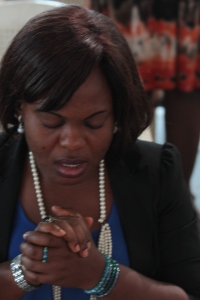Sunday Service 4 May 2014
Key Passage: ‘‘And when the people complained, it displeased the LORD: and the LORD heard it; and his anger was kindled; and the fire of the LORD burnt among them, and consumed them that were in the uttermost parts of the camp.’’ Numbers 11:1
Introduction
Exactly a week ago, we were at the peak of our 24th convention with the theme: The Mighty Hand of God. We had all prepared so hard and, of course, there were high expectations and hopes for a mighty visitation of the LORD. And as anticipated, the LORD truly visited us with manifold testimonies. Therefore, it is most appropriate to thank Him for all His goodness; provision, healings, and more at a time like this. To this end I have captioned this sermon, The Heart That Pleases God.
In Retrospect
In the course of the convention a number of speakers recalled the days of captivity of Israel in Egypt. As God promised to redeem His people from captivity, so did He by His mighty hands. From one end of Egypt to the other, God’s handwriting was seen. God did not spare the gods of Egypt, as He directed his plagues at the gods of the land, just to free His people from bondage. Not only did God secure the release of people through His miraculous signs, as we were told, He ensured that their years of slavery were fully paid for.
Unfortunately, rather than remain grateful to God for their miraculous deliverance, hell was let loose as they took to murmuring barely a few days after they had seen the power of God in Egypt. Right from the crossing of the Red Sea and all through their years in the wilderness, they did nothing but murmur against the LORD and Moses. Just as God unleashed 10 plagues against the gods of Egypt, the people of Israel unleashed 10 complaints against God as if to pay Him back for each plague.
There was hardly a thing they did not murmur about. They murmured at the Red Sea, they murmured about water, about meat, about bread, accused God and Moses of deliberately taking them into the wilderness to kill them with their wives and children. Aaron and Miriam murmured against Moses. They said they had better food to eat in Egypt and worst of all; they made an idol to worship instead of worshiping and remaining grateful to the LORD who brought them out of slavery in Egypt.
As our text says: ‘‘And when the people complained, it displeased the LORD: and the LORD heard it; and his anger was kindled; and the fire of the LORD burnt among them, and consumed them that were in the uttermost parts of the camp” (Numbers 11:1)
A time came when their murmurings, i.e. complaints, and grumblings displeased the LORD. The Bible in Basic English puts it this way: ‘‘Now the people were saying something evil against the Lord; and the Lord hearing it, was angry and sent fire on them, burning the outer parts of the tent-circle.’’ An ungrateful heart displeases the LORD, but a thankful heart is pleasing to Him. An ungrateful heart is evil in the sight of the LORD but a thankful heart makes God glad.
These were a people that experienced God’s miraculous deliverance. They saw untold wonders never recorded in human history. Yet they turned around accusing God of deliberately starving and plotting to kill them in the wilderness. This was nothing but ingratitude. To this end they were consumed by God’s fire.
The attitude of the people portrayed one thing; that they did not have faith enough in God to protect, provide and preserve them. Thus, they sought to have an idol to worship. If they were thankful to God, they would have had faith in God to meet their every need. Thus, an unthankful heart breeds faithlessness.
In Paul’s direct reference in 1 Corinthians 10: 1 – 5 about the evil of the people in the wilderness, Paul maintained that though the people experienced God’s goodness, many of them died along the way, thus, were not able to enter the Promised Land.
The question is; why did they not enter the Promised Land? They had an ungrateful heart…their hearts were not pleasing to God. Rather than thank the LORD for all His goodness, Israel complained against God. An ungrateful heart might lead to an unexpected outcome.
And so Paul said, let this be an example unto us:
No doubt, God visited us at our 24th convention. We all saw His hands move mightily in our midst. Some may have left the convention with tonnes of blessings, others with kilos, some still with grammes and even less. But whatever God has blessed us with at our just concluded convention, may we be thankful to Him.
We are presently on our march towards the 25th Annual Convention of He’s Alive Chapel come 2015. But our harvest in 2015 will be greatly determined by the state of our hearts, i.e. our gratitude towards God. Our thankful hearts to God for His goodness towards us this year will be the bridge to link us with the blessings God has for us come 2015. Many fell along the way before entering the Promised Land. May we not be like them who for ingratitude were denied God’s promises.
What to do to remain thankful
- Recount God’s goodness: David wrote in Psalm 9: 1 saying, ‘‘I WILL praise You, O Lord, with my whole heart; I will show forth (recount and tell aloud) all Your marvellous works and wonderful deeds.’’ Amplified. When we recount, remember and testify of all the goodness of God towards us, we will remain grateful to Him
- Give thanks at all times: 1 Thessalonians 5:18 says, ‘‘Whatever happens, give thanks, because it is God’s will in Christ Jesus that you do this.’’ God’s Word. Whatever happens…in gain or in loss, in laughter or in tears, in difficult times or in joy; we are called to give thanks to God, for this is how God expects us to live as His children.
- Do not compare yourself with others or wish to be like them. Understand what God’s will for you and live according to His will (1 Thessalonians 5:18).
- Stop complaining; rather praise Him for all He has done for you.
- Be satisfied with what God has blessed you with (1 Timothy 6:6)
King David was a typical example of a man who understood the essence of thanksgiving. Not only did he point out the sins of ingratitude of Israel in the wilderness during their 40 year sojourn as seen in Psalm 106, he went on to show an example of a thankful heart in 1 Chronicles 16. With the return of the Ark of the LORD to the City of David, he appointed men to daily serve the LORD in worship and thanksgiving before the Ark that signified the presence of the LORD.
Thanksgiving, therefore, should be our daily service unto the LORD.
Conclusion
As I conclude, permit to me to read out a story about the Duke of Wellington. The Duke of Wellington was the great British military leader who regretted that he had not learned the secret of praise during his lifetime. He had many great accomplishments and even defeated Napoleon at Waterloo. He was a brilliant and demanding man and when he was older, he realized that there were areas in his life that needed to change. In his old age a woman asked him this question, “What would you do differently if you had your life to live over again?” He thought carefully and said, “I would give more praise.”












